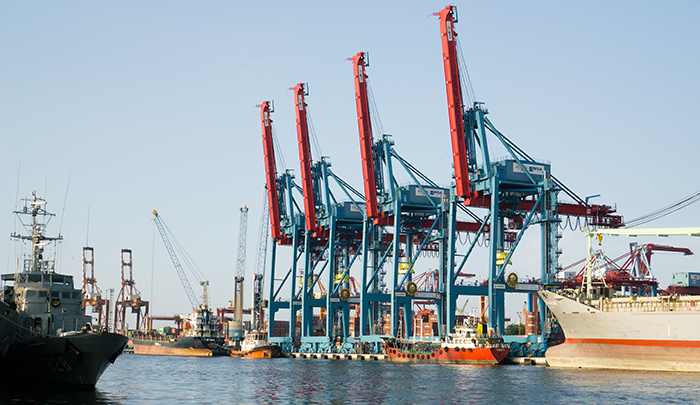
Indonesia integrating ports to attract transshipments
Indonesia is taking several new measures to improve the economics and efficiency of its maritime logistics sector.
Jakarta is implementing a plan to enable the country’s ports to capture a larger share of transshipment business related to domestic cargo. It is also introducing a series of regulatory changes to support more investment and private sector participation in maritime logistics and reduce cargo dwell times at ports throughout the archipelago.
An agreement to jointly develop a new $3 billion deep-sea port with Japan has also been signed.
The transport ministry said it is working with the four dominant state-owned port operators on a plan to support the implementation of a hub and spoke system for domestic cargo distribution centered on Tanjung Priok as a primary domestic and international hub port.
The “integrated chain port” plan includes development of an information technology management system and changes to regulation that the administration said will help bring home a larger share of transshipment business that originates domestically.
Indonesia has more than 10,000 inhabited islands spread over an area as wide as the United States. Much of the export cargo handled by secondary ports such as Kuala Tanjung in North Sumatra, Bitung in North Sulawesi, Makassar in South Sulawesi, Sorong in West Papua, and Tanjung Perak is currently transshipped via Singapore.
An improved maritime logistics management system that can efficiently integrate and manage cargo flows from different island sources is regarded by the administration of President Joko Widodo as central to bring down logistics costs that the World Bank estimates are around 24 percent of gross domestic product.
Indonesia on Jan. 15 signed an agreement with Japan to develop a deep-sea port at Patimban intended to supplement the gateway and transshipment hub functions of Tanjung Priok.
The $3 billion facility is being built around 100 kilometers (62 miles) from Jakarta and will eventually have capacity to handle 7.5 million 20-foot-equivalent units annually.
The agreement was signed by Japanese Prime Minister Shinzo Abe during his recent visit to Jakarta while on a four-nation tour of Southeast Asia.
At the end of 2016, the transport ministry said it would reduce transshipment charges to support the development of the national hub and spoke cargo distribution.
Shippers and container terminal operators expressed concerns over the idea, with the former arguing that lower transshipment fees would in effect reduce flexibility for cargo owners and add costs in supply chains.
The national container terminal operators association said transshipment costs needed to remain competitive with neighboring countries and noted they were already lower than both Singapore and Malaysia.
As part of its incoming national economic stimulus plan, the government said it will revise up to 20 regulations with a view to boosting investment and efficiency in the logistics sector. Among other benefits, the reforms are designed to improve the functions and usage of the national single window for trade and support more private investment in the logistics sector.
Further pressure is also expected to be applied on state-owned port operators to reduce cargo dwell times, which the president has vowed to bring down to 2.2 days at Tanjung Priok. Dwell times at secondary and tertiary ports across the country have also being targeted for reduction.
Average dwell times at Tanjung Priok were down to between 3.7 and 4.2 days at the end of 2016, from more than one week a year ago, while dwell times at other major ports, including Belawan on the northeast coast of Sumatra and Tanjung Perak in Java, averaged around eight days.
Coordinating Minister for Maritime Affairs Luhut Binsar Panjaitan threatened state-owned port operators with more private sector involvement if they failed to deliver the dwell time reductions.
“If [the state-owned port operator] Pelindo is struggling with it then ask a private party to be more transparent. We can’t afford to be late because dwelling time is expensive, and we need to [cut costs],” Luhut told local media.
The state-owned port operators have been told to make operations more efficient, increase berth productivity, and improve intermodal linkages and cargo tracking. They have also been told to find ways to reduce handling and clearance fees.
The government said at the end of last year that 24-hour operations may be implemented at major ports and that it would double the number of bonded logistics centers in the country.
Tanjung Priok, the largest seaport, handled 5.4 million TEUs in 2016 compared with 5.2 million the previous year. The port opened a new container terminal in September, adding 1.5 million TEUs to its existing 7 million TEUs of capacity.
Reference: http://www.joc.com/port-news/terminal-operators/indonesia-works-integrate-ports_20170126.html
(Accessed on February 6, 2017, 14:01 WIB)
